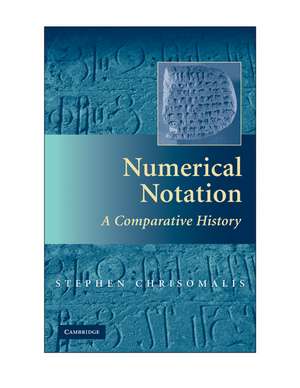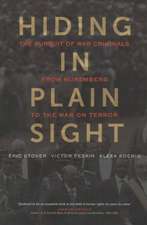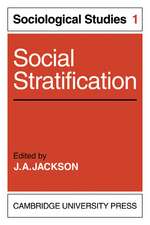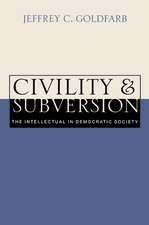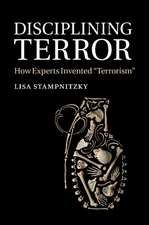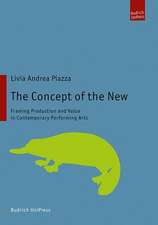Numerical Notation: A Comparative History
Autor Stephen Chrisomalisen Limba Engleză Hardback – 17 ian 2010
Preț: 869.22 lei
Preț vechi: 1010.72 lei
-14% Nou
Puncte Express: 1304
Preț estimativ în valută:
166.34€ • 173.45$ • 138.25£
166.34€ • 173.45$ • 138.25£
Carte tipărită la comandă
Livrare economică 20 martie-03 aprilie
Preluare comenzi: 021 569.72.76
Specificații
ISBN-13: 9780521878180
ISBN-10: 0521878187
Pagini: 496
Ilustrații: 33 b/w illus. 166 tables
Dimensiuni: 161 x 236 x 35 mm
Greutate: 0.79 kg
Editura: Cambridge University Press
Colecția Cambridge University Press
Locul publicării:New York, United States
ISBN-10: 0521878187
Pagini: 496
Ilustrații: 33 b/w illus. 166 tables
Dimensiuni: 161 x 236 x 35 mm
Greutate: 0.79 kg
Editura: Cambridge University Press
Colecția Cambridge University Press
Locul publicării:New York, United States
Cuprins
1. Introduction; 2. Hieroglyphic systems; 3. Levantine systems; 4. Italic systems; 5. Alphabetic systems; 6. South Asian systems; 7. Mesopotamian systems; 8. East Asian systems; 9. Mesoamerican systems; 10. Miscellaneous systems; 11. Cognitive and structural analysis; 12. Social and historical analysis; 13. Conclusion.
Recenzii
'Stephen Chrisomalis's Numerical Notation is an extraordinary book, comprehensively assembling information about a central human mode of notation, which is more widespread than writing systems and yet has never been fully explored. The author, who writes in an exceptionally lucid style, also offers cogent interpretations of the patterns that he identifies.' John Baines, University of Oxford
'Numbers are necessary to reasoned human existence yet largely unconsidered by those who use them. This important book brings together, in a polished and erudite presentation, the latest thoughts on the origins, development, meanings, and theories of numbers. Few people could have pulled off such a study. That Chrisomalis has done so speaks to the magisterial authority of the volume and its fresh views on the cultural basis and historical contours of quantification.' Stephen Houston, Brown University, Rhode Island
'In this extraordinary and unprecedented book, Stephen Chrisomalis succeeds in doing for numerical notations what the great theorists of the last generation – Gelb, Diringer, and Cohen – did for written language, providing an account that is encyclopedic in scope, conceptually rich, and explanatorily adequate to account for the origins, the transformations, the social uses, and the psychological implications of the world's remarkable systems for the notation of number.' David Olson, author of The World on Paper and University Professor Emeritus, University of Toronto
'What this study has done is to remove the history of numerical notation from an outdated unilinear evolutionary scheme and place it in a new framework that puts no stock in progressivism as an inexorable consequence of history. It seems to me that no future work of numeral notation will be able to ignore this study. The detailed analysis and typology offered here, as well as the theoretical and interpretational exposition, sets a standard for future discussion of numerical notation as a social, technological, and cognitive phenomenon.' Francesca Rochberg, University of California, Berkeley
'Stephen Chrisomalis's Numerical Notation is a work of extraordinary scholarship and erudition. The author guides the reader on an informed and highly engaging survey of number naming systems around the world, from the cuneiform sexagesimal numeration of ancient Mesopotamia to the Indian-derived decimal numeration of much of the modern world. Along the way, Chrisomalis explores a host of intriguing intellectual historical questions relating to not just how different societies have met the challenges of classifying and naming quantities, but other matters of broad linguistic, philosophical, and anthropological interest. This book is destined to become a standard reference work in the field for many years to come.' Gary Urton, Harvard University, Massachusetts
'In not quite five hundred … dense but exceptionally clearly written pages, the young anthropologist Stephen Chrisomalis has managed to produce what would be for most people a crowning achievement of a life in scholarship: a monograph that is both astonishing in its comprehensiveness and careful about detail; that is both a work of reference and something that can be picked up and read, whether in whole or in part; that is both theoretical and data-driven; and that is simultaneously polemical in its attitudes and illuminating in its analyses.' Joshua T. Katz, Journal of the American Oriental Society
'Chrisomalis's historical accounts are always impeccably clear … he provides all kinds of fascinating historical and cultural tidbits.' Ernest Davis, SIAM News
'Numerical Notation is a masterly work - comprehensive, authoritative, and methodologically rigorous. It will be a cornerstone in the study of number systems for years to come.' Amir Alexander, Comparative Studies in Society and History
'Chrisomalis writes clearly and concisely. He has an excellent sense of balance and great methodological awareness - unlike some of the extant literature on the subject. He has produced, in my view, the definitive account of numerical notation for some time to come.' Serafina Cuomo, Antiquity
'… a substantial achievement in the intersection of the history of mathematics with anthropology.' Grattan Guinness, Annals of Science
'Numerical Notation: A Comparative History will remain a key reference text for years to come.' G. E. R. Lloyd, Isis
'By any standards, Stephen Chrisomalis's book is an illuminating work of extraordinary and unseen scholarship and it will certainly become the reference in the field for many years to come.' Jean-Claude Martzloff, Zentralblatt MATH
'This extraordinary book sheds new light on an often-simplified area. Linguists, anthropologists, historians, philosophers, and mathematicians would be well advised to read this delightful book … Highly recommended.' R. L. Pour, Choice
'Numerical Notation: A Comparative History is an important contribution to the study of the history and structure of numerical systems. It is well-written, well-edited, and packed with information. This book is an essential component of any college library and will be a well-thumbed reference for historians of mathematics.' James V. Rauff, Mathematics and Computer Education
'Numbers are necessary to reasoned human existence yet largely unconsidered by those who use them. This important book brings together, in a polished and erudite presentation, the latest thoughts on the origins, development, meanings, and theories of numbers. Few people could have pulled off such a study. That Chrisomalis has done so speaks to the magisterial authority of the volume and its fresh views on the cultural basis and historical contours of quantification.' Stephen Houston, Brown University, Rhode Island
'In this extraordinary and unprecedented book, Stephen Chrisomalis succeeds in doing for numerical notations what the great theorists of the last generation – Gelb, Diringer, and Cohen – did for written language, providing an account that is encyclopedic in scope, conceptually rich, and explanatorily adequate to account for the origins, the transformations, the social uses, and the psychological implications of the world's remarkable systems for the notation of number.' David Olson, author of The World on Paper and University Professor Emeritus, University of Toronto
'What this study has done is to remove the history of numerical notation from an outdated unilinear evolutionary scheme and place it in a new framework that puts no stock in progressivism as an inexorable consequence of history. It seems to me that no future work of numeral notation will be able to ignore this study. The detailed analysis and typology offered here, as well as the theoretical and interpretational exposition, sets a standard for future discussion of numerical notation as a social, technological, and cognitive phenomenon.' Francesca Rochberg, University of California, Berkeley
'Stephen Chrisomalis's Numerical Notation is a work of extraordinary scholarship and erudition. The author guides the reader on an informed and highly engaging survey of number naming systems around the world, from the cuneiform sexagesimal numeration of ancient Mesopotamia to the Indian-derived decimal numeration of much of the modern world. Along the way, Chrisomalis explores a host of intriguing intellectual historical questions relating to not just how different societies have met the challenges of classifying and naming quantities, but other matters of broad linguistic, philosophical, and anthropological interest. This book is destined to become a standard reference work in the field for many years to come.' Gary Urton, Harvard University, Massachusetts
'In not quite five hundred … dense but exceptionally clearly written pages, the young anthropologist Stephen Chrisomalis has managed to produce what would be for most people a crowning achievement of a life in scholarship: a monograph that is both astonishing in its comprehensiveness and careful about detail; that is both a work of reference and something that can be picked up and read, whether in whole or in part; that is both theoretical and data-driven; and that is simultaneously polemical in its attitudes and illuminating in its analyses.' Joshua T. Katz, Journal of the American Oriental Society
'Chrisomalis's historical accounts are always impeccably clear … he provides all kinds of fascinating historical and cultural tidbits.' Ernest Davis, SIAM News
'Numerical Notation is a masterly work - comprehensive, authoritative, and methodologically rigorous. It will be a cornerstone in the study of number systems for years to come.' Amir Alexander, Comparative Studies in Society and History
'Chrisomalis writes clearly and concisely. He has an excellent sense of balance and great methodological awareness - unlike some of the extant literature on the subject. He has produced, in my view, the definitive account of numerical notation for some time to come.' Serafina Cuomo, Antiquity
'… a substantial achievement in the intersection of the history of mathematics with anthropology.' Grattan Guinness, Annals of Science
'Numerical Notation: A Comparative History will remain a key reference text for years to come.' G. E. R. Lloyd, Isis
'By any standards, Stephen Chrisomalis's book is an illuminating work of extraordinary and unseen scholarship and it will certainly become the reference in the field for many years to come.' Jean-Claude Martzloff, Zentralblatt MATH
'This extraordinary book sheds new light on an often-simplified area. Linguists, anthropologists, historians, philosophers, and mathematicians would be well advised to read this delightful book … Highly recommended.' R. L. Pour, Choice
'Numerical Notation: A Comparative History is an important contribution to the study of the history and structure of numerical systems. It is well-written, well-edited, and packed with information. This book is an essential component of any college library and will be a well-thumbed reference for historians of mathematics.' James V. Rauff, Mathematics and Computer Education
Notă biografică
Descriere
This book is a cross-cultural reference volume of all attested numerical notation systems, encompassing more than 100 such systems used over the past 5,500 years.
